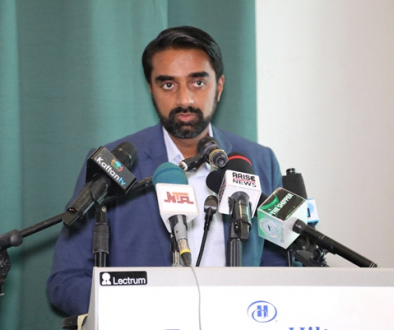PERL: The New DFID Governance Programme in Nigeria

The Partnership to Engage, Reform and Learn (PERL) is a UK Department for International Development (DFID) governance programme in Nigeria being run by a consortium which includes the Integrity Organisation. The programme is a combined successor of previous programmes – the Federal Public Administration Reform (FEPAR), the State Accountability and Voice Initiative (SAVI) and the State Partnership for Accountability, Responsiveness and Capability (SPARC). PERL is a five-year Public-Sector Accountability and Governance programme that operates out of seven (7) locations across the country including three (3) partnership states (Jigawa, Kaduna & Kano), three (3) regions (Northeast, Southeast & Southwest) and the Federal component (based in the FCT). The programme is made up of 3 pillars, which all work as one programme, through one team and reflecting one message. Pillar 1 is the Accountable, Responsive and Capable Government (ARC), Pillar 2 is the Engaged Citizens Partnership (ECP) and Pillar 3 is the Learning, Evidencing and Advocacy Partnership (LEAP).
In the Southwest region, Integrity Organisation is responsible for delivering of the programme component in collaboration with ECP management. The approach seeks to strategically coordinate learning processes, form partnership around service delivery issues, harnessing the gains of good reforms, effective practices and success stories from state actors and constituent group stakeholders including the civil society, private sector and media across the region so that these can be shared, adapted and replicated in other states of the region. This approach is achieved by facilitating linkages, partnerships and relationships among relevant stakeholders including actors, knowledge hubs and platforms facilitating public discourse for better policy decision-making. The programme is currently in its first full implementation year that will run from April 2017 until March 2018 having completed two pre-implementation phases (known as inception and bridge periods) between May 2016 and March 2017.
Achievements
Since PERL began its work in the region, it has recorded significant progress in its legislative engagement, media partnership and other civic engagements. The programme has facilitated the legislature in the region to make concerted efforts towards having a clear regional roadmap for ensuring improvement in legislative practices for the benefit of citizens. Through support provided to the Deputy Chairman of the Conference of Speakers – Southwest Zone, Rt. Hon. Adesina Michael Adeyemo, PERL had facilitated the inauguration of the Southwest Legislative Reform Implementation Committee (SLRIC). The committee, armed with its Terms of Reference, is guided by a legislative agenda which was developed by Speakers and members of legislatures from the State Houses of Assembly across the region to address key issues of service delivery to citizens. At the meeting, Rt. Hon. Adeyemo observed that the SLRIC would help in the “pursuance of uniform Legislative framework in the Southwest region, as well as development and validation of Legislative reform solutions”.
In the build-up to instituting the SLRIC, several legislative meetings were held to deliberate frameworks of a regional legislative agenda especially around service delivery issues such as; structured constituency engagements, legislative autonomy and so on. One of such was the Meeting of the Leadership and Management of State Houses of Assembly across the region (see Picture 1) which held in Ibadan in December 2016. At this meeting, Rt. Hon. Adesina Michael Adeyemo remarked that the legislature is the hope of citizens and it behoves on parliamentarians to make pro-people laws for the good of constituents. He also noted that their actions or inactions of the present day will be adjudged by posterity, admonishing others to ensure follow up for the agreed communique so that there could be conclusive action planning for the benefit of the people. The SLRIC has become an instrumental platform for facilitating and monitoring participation of members of the legislature across the region in the current national drive to establish a legislative network on universal health coverage for the purpose of increasing health budgets, insurance and coverage.
Learning events and media engagements
There have been several learning events facilitated by PERL across the region among which the Southwest Governance Innovations Conference (SWGIC) 2017 held in Abeokuta in February 2017 is most significant. The Conference was well attended by the host Governor, his Deputy, Government functionaries from the other five states as well as Speakers and legislative members from four states of the region (Lagos, Ogun, Oyo and Osun states). ECP component of PERL facilitated the active participation of private sector and civil society stakeholders to share their good practices with other actors for learning, adaptation and uptake. Prior to the conference, ECP brought together traditional and new media stakeholders for a Media Roundtable coordinated by the DAWN Commission to brief the public about essentials of the SWGIC and the greater objective of developing an integrated economic and social reform agenda for the six states of the region.
The media has since been brought on board to assist stakeholders in transforming critical evidence from their engagements into policy change by serving as linkages, platforms and critical channels for increasing citizens’ voice. An event was also organised by PERL to highlight key areas of work of relevant stakeholders that can be plugged into diverse media channels for increasing citizens’ voice (see Picture below).



In June 2017, another learning event organised by PERL in partnership with the Justice, Development and Peace Commission (JDPC) in Ibadan shared the principles of a robust civic engagement approach known as the Civil Coalition for Good Governance (CCGG). Stakeholders from across the region shared their experiences of engaging with government highlighting challenges and opportunities in the process. The benefits of deploying an approach like the CCGG was discussed and action steps were identified on how to expand the categories of stakeholders adopting and adapting the CCGG approach.
PERL-ECP Partners in the Southwest region
Within the pre-implementation periods, PERL engaged a diverse range of stakeholders (including state government actors, the state legislatures, business membership organisations, private sector, media and the civil society) to highlight key issues of regional resonance and to map the status of activities across these areas. Over the past couple of months, within the first year of implementation, the programme started consolidating some of the established stakeholder relationships to identify and cluster actors around two priority areas of engagement – Ease of Doing Business and Agriculture. Currently, PERL is in the process of expanding partnerships around key issues of service delivery within these two priority areas whilst being open to working on alternative issues like the legislative network on universal health coverage as they arise.
Overall, some of the critical partners of the ECP pillar of the PERL programme include: Justice, Development and Peace Commission (JDPC) Ibadan, Conference of Speakers – Southwest Zone, Council of Clerks – Southwest Zone, Oyo State House of Assembly, Development Agenda for Western Nigeria (DAWN) Commission, Odua Chamber of Commerce, Industry, Mines and Agriculture (ODUACCIMA) and Ogun State Council of Chambers of Commerce, Industry, Mines and Agriculture (OGUNCCIMA). Other potential partners considered for expanding partnerships include: International Institute of Tropical Agriculture (IITA), Nigerian Institute for Social and Economic Research (NISER), LEAP Africa, BudgIT, Online Hub, Center for Public Policy Alternatives (CPPA), Ibadan School of Governance and Public Policy (ISGPP), Federation of Muslim Women’s Associations in Nigeria (FOMWAN) among others. These stakeholders which include civil society, government institutions, private sector and media cut across the wide range of knowledge hubs and platforms for facilitating public discourse in the Southwest region.


